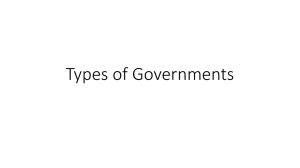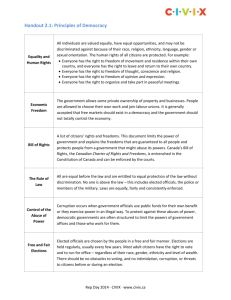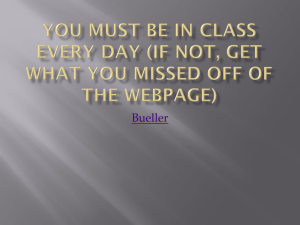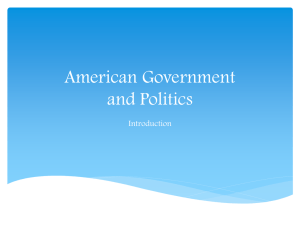What Makes Democracy? - Educational Initiatives
advertisement
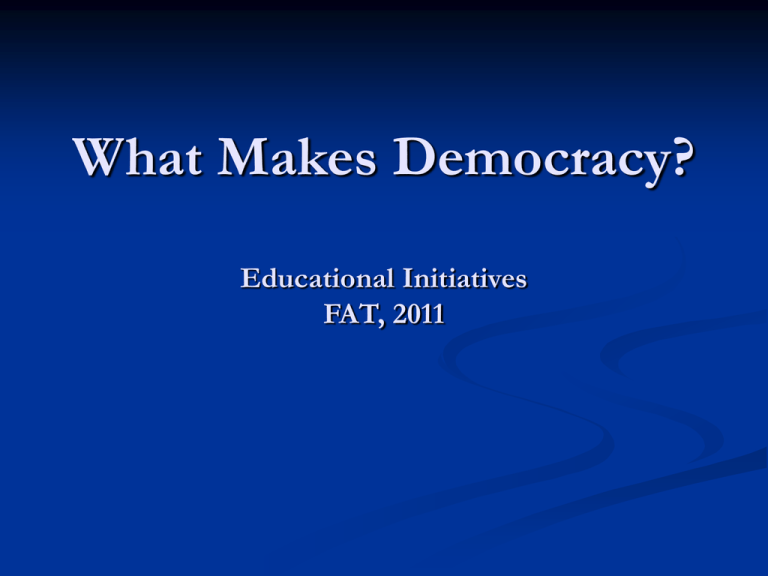
What Makes Democracy? Educational Initiatives FAT, 2011 Core characteristic Democracy is based on the freely expressed will of the people to determine their own political, economic, social and cultural systems and their full and free participation. Democracy is primarily about right to chose and right to change the holders of the political power in a regular, fair and free elections. (electoral democracy). Essential characteristic: Positions of political power are filled through regular, free, and fair elections between competing parties, and it is possible for an incumbent government to be turned out of office through elections. Declaration of Independence, USA, 1776 "We hold these truths to be self-evident, that all men are created equal, that they are endowed by their Creator with certain unalienable Rights, that among these are Life, Liberty and the pursuit of Happiness. That to secure these rights, Governments are instituted among Men, deriving their just Powers from the Consent of the Governed...„ The most fundamental concept of democracy is the idea that government exists to secure the rights of the people and to implement its will and must be based on the consent of the governed. FH criteria for an electoral democracy: A competitive, multiparty political system; Universal adult suffrage; Regularly contested elections conducted on the basis of secret ballots, reasonable ballot security and the absence of massive voter fraud; Significant public access of major political parties to the electorate through the media and through generally open political campaigning. Dahl’s concept of polyarchy All adult citizens have the right to vote; All adult citizens are eligible for public office; Political leaders have the right to compete for votes; Elections are free and fair; All citizens are free to form and join political parties and other organisations; All citizens are free to express themselves on all political issues; Diverse sources of information about politics exist and are protected by law; Government policies depend on votes and other expressions of preference. Fundamental features of a democracy: Government based on majority rule and the consent of the governed; Political pluralism (multiparty system) and free, fair and regular elections; Constitutional limits on government Majority rule / minority rights Rule of law & equality before the law; Due process. Fundamental features of a democracy: Accountability and Transparency Economic Freedom Respect to Basis Human Rights Freedom of Expression Freedom of Association Freedom of Religion FH ratings are based on questions such as: Are the legislative representatives elected through free and fair elections? Do the people have the right to organize in different political parties or other competitive political groupings of their choice, and is the system open to the rise and fall of these competing parties or groupings? Are there free trade unions and peasant organizations or equivalents, and is there effective collective bargaining? Are there free professional and other private organizations? FH ratings: Is there academic freedom, and is the educational system free of extensive political indoctrination? Does the rule of law prevail in civil and criminal matters? Is the population treated equally under the law? Are police and military under direct civilian control? Are property rights secure? Do citizens have the right to establish private businesses? Is private business activity unduly influenced by government officials, the security forces, or organized crime? More expanded definition: Consensus on basics of society, what are the core identities and values, for example consensus what is the territory, who is citizen and who is not, etc. Basic civic and political rights are respected, particularly freedom of expression, of information and of association. Citizens have the right to express themselves on political matters, without the risk of state punishment. Citizens have the right to seek out alternative sources of information. Citizens have the right to form independent associations, including independent political parties and interest groups. Liberal democracy All democracies are systems in which citizens freely make political decisions by majority rule. But rule by the majority is not necessarily democratic. In a democracy majority rule must be combined with guarantees of individual human rights and the rights of minorities. Right to chose Free & fair elections. Elections are primarily between different parties, political and ideological groupings, but there are other competitions within the democratic society, competition between government & press, between civil society & the government, between central & regional governments. Division between the executive, legislative and juditiary power Control over government decisions about policy is constitutionally vested in elected representatives. Elected representatives exercise their constitutional powers without facing overriding opposition from unelected officials. Elected representatives have effective control over State force, whether civilian or military. Independent judiciary and legal profession, and investigative forces operating under rules designed to ensure impartiality and integrity. Rue of law State, including policy-makers, ministerial civil servants, and members of the repressive apparatus (army, police) as well as economic elites must obey rules. Inclusion, non-discrimination, respect to minority rights If parts of the society (some minorities) are excluded, we do not have democracy. Citizens should be able to exercise their rights in a democracy without any discrimination as to race, color, sex, language, religion, political or other opinion, national or social origin, property, birth or other status. Democratic state encourage and invest in the participation if minorities. Equal chances are important characteristic of democracy. This means providing practical help to overcome obstacles of status and/or condition. Good governance Institutions work well, they are efficient, they deliver in a reasonably long and predictable time what they are instituted for, and they serve broader public interests not private or particular interests. When we say institutions, we mean primarily governmental, state institutions (government, judiciary, police, prosecutors, infrastructure, educational system, health care and social services system etc). Transparency and accountability Transparency involves the public having access to reliable information on how those who exercise public power use it, especially their use of public resources. Accountability involves those who exercise powers of government being answerable to elected representatives for their actions, as well as being responsible before the law. Participation is also a necessary Citizens cannot be required to take part in the political process, and they are free not to participate. However, a healthy democracy requires the active, freely chosen participation of citizens in public life. Democracies flourish when citizens are willing to participate in public debate, elect representatives and join political parties. Without this broad, sustaining participation, democracy begins to wither and become the preserve of small, select groups. Democratic political culture A democratic political culture is also crucial for functioning and sustainability of democracy. A culture of passivity and apathy, an obedient citizenry, are not consistent with democracy. The electoral process periodically divides the population into winners and losers. A democratic political culture implies that the losing parties and their supporters accept the judgment of the voters, and allow for the peaceful transfer of power. Economist categorization: Full democracies: Basic political freedoms and civil liberties are respected. Political culture is conducive to the flourishing of democracy. The functioning of government is satisfactory. Media are independent and diverse. There is an effective system of checks and balances. The judiciary is independent and judicial decisions are enforced. Flawed democracies: These countries also have free and fair elections and even if there are problems (such as infringements on media freedom), basic civil liberties will be respected. However, there are significant weaknesses in other aspects of democracy, including problems in governance, an underdeveloped political culture and low levels of political participation. Hybrid regimes: Elections are not free and fair. Government pressure on opposition parties and candidates. Serious weaknesses in political culture, functioning of government and political participation. Corruption is widespread and the rule of law is weak. Civil society is weak. Typically there is harassment of and pressure on journalists, and the judiciary is not independent. Authoritarian regimes: Political pluralism is absent or heavily limited. Elections, if they do occur, are not free and fair. There is disregard for abuses of civil liberties. Media are state-owned or controlled by groups connected to the ruling regime. There is repression of criticism of the government and censorship. There is no independent judiciary. Types of Governments Absolute monarchy – ruled by one person who passes on the power to rule in his or her family (the leader is the king or queen); Constitutional monarchy – there is a king or queen, but his/her powers are limited and listed in the constitution; most of the political decisions are made by the elected government; Republic – there is no king or queen; rule is by the people – there may be an elected government, a one-party government, or a military government; Democratic – the government is elected. Presidential Democracy – the leader of the country is directly elected by the citizens Parliamentary Democracy – the citizens vote for the parties that will be in Parliament, and the Parliament votes on who will be the prime minister (usually the head of the party which won the most votes) Military regime –the top military leaders rule the country Dictatorship – one person rules the country. Technically, a dictatorship means rule by one person, but people often use military or one-party dictatorship.

